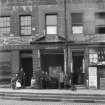Pricing Change
New pricing for orders of material from this site will come into place shortly. Charges for supply of digital images, digitisation on demand, prints and licensing will be altered.
Upcoming Maintenance
Please be advised that this website will undergo scheduled maintenance on the following dates:
Thursday, 9 January: 11:00 AM - 3:00 PM
Thursday, 23 January: 11:00 AM - 3:00 PM
Thursday, 30 January: 11:00 AM - 3:00 PM
During these times, some functionality such as image purchasing may be temporarily unavailable. We apologise for any inconvenience this may cause.
Edinburgh, 513 Lawnmarket
Tenement (16th Century)
Site Name Edinburgh, 513 Lawnmarket
Classification Tenement (16th Century)
Alternative Name(s) Milne's Court; Mylne's Court
Canmore ID 52285
Site Number NT27SE 265
NGR NT 25514 73563
Datum OSGB36 - NGR
Permalink http://canmore.org.uk/site/52285
- Council Edinburgh, City Of
- Parish Edinburgh (Edinburgh, City Of)
- Former Region Lothian
- Former District City Of Edinburgh
- Former County Midlothian
NT27SE 265 25511 73563
Built by Robert Mylne 1690. Six-storey and attic. Partially repaired 1914. Restored 1968-70, Ian G Lindsay and Partners.
RCAHMS 1951.
Earliest open square substituted for close.
ARCHITECT: R Mylne 1690
REFERENCE: NATIONAL LIBRARY OF SCOTLAND
R S Mylne's Master Masons I p.227 & 241
NATIONAL LIBRARY OF SCOTLAND: "Water colour Sketches by T Brown" Adv. MSS 34.8.1-3 -1 sketch
NMRS REFERENCE:
Edgar's Maps of 1765 & 1742 - 'Miln's Square'
Ainslie's Map 1789, 1804 - 'Miln's Square'.
Unable to locate at time of upgrade 15.2.2000.
(Undated0 information in NMRS.
Publication Account (1951)
12. Milne's Court, 517 Lawnmarket.
This court, built on the N. side of the Lawnmarket by James Mylne, King's Master Mason, is the earliest of the post-Revolution housing-schemes. Entered from the main street through a passage in the lower part of a large and handsome ashlar-fronted tenement [NT27SE 265 etc], six storeys and an attic in height, the Renaissance entrance bearing the date 1690 within the pediment. The ground floor of the front building has been converted into shops. The upper ones, all considerably modernised inside, are entered from two spacious solid-newel staircases embodied in the back of the building and not projecting from it. The contemporary block on the N side of the Court [NT27SE 266] is built of rubble throughout. Five-storeyed towards the Court, it has six floors and an attic behind, where the ground falls steeply to North Bank Street; and, as in the other block, a passage runs through the base while access to the upper floors is had by a sold-newel stair. The stark, cliff-like, N elevation, partly hidden by the High Church, is relieved above the eaves by crow-stepped gablets and massive chimney-stalks. The internal accommodation is well planned, with good rooms conveniently arranged; some of these are panelled and have moulded and carved fireplaces. The six-storeyed building on the E. side of the Court [NT27SE 5765], which is entered from a projecting, octagonal stair-tower, must on the evidence of its boldly moulded doorway be three-quarters of a century older than the foregoing, but internally it contains nothing of interest. The low extension on its S. side, now a workshop, is contemporary and has a bolection-moulded fireplace in the common gable.
RCAHMS 1951











































![Mylnes Court, Edinburgh University Hall of Residence.
Scanned image of IGL W503/6/13 [negative number to be supplied].](http://i.rcahms.gov.uk/canmore/l/SC00841621.jpg)

































































![Mylnes Court, Edinburgh University Hall of Residence.
Scanned image of IGL W503/6/13 [negative number to be supplied].](http://i.rcahms.gov.uk/canmore/s/SC00841621.jpg)




























